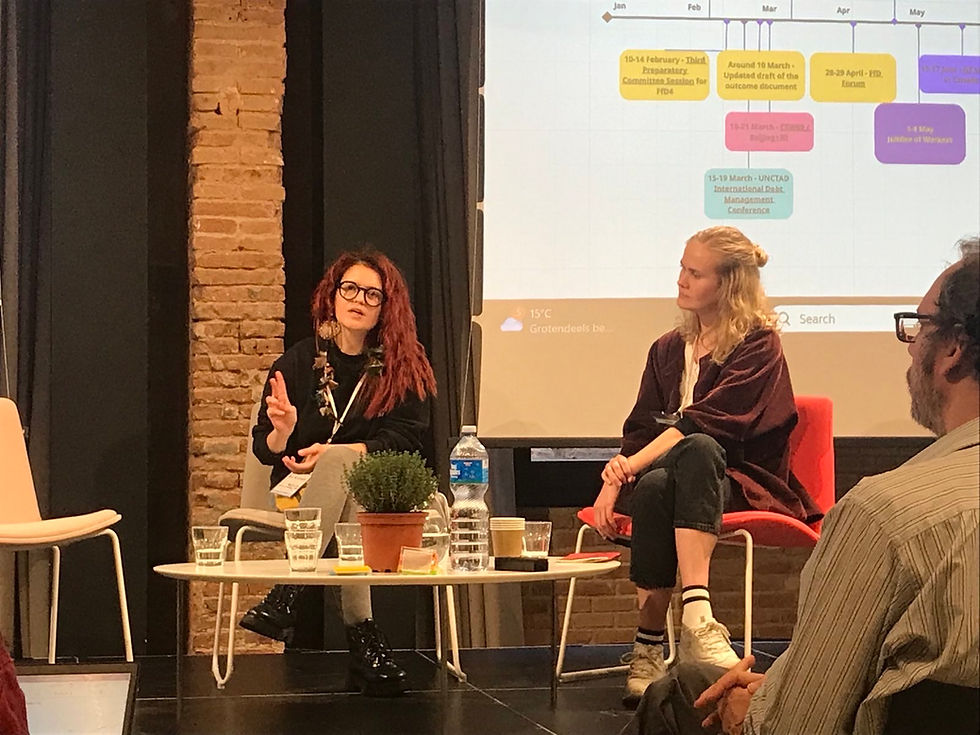Mobilising for Financial Justice: Debt For Climate at the Eurodad Conference in Barcelona
- Evke Bakker
- Feb 13, 2025
- 4 min read

On January 28th and 29th, the bi-yearly Eurodad Conference took place in Barcelona, setting the stage for the upcoming fourth UN Financing for Development (FfD4) conference in Sevilla from June 30th to July 3rd. With over 200 participants from across the globe, the event provided a constructive and necessary platform to discuss key financial justice issues and the critical decisions that must be made at FfD4 to achieve global financial justice. Five members of Debt For Climate were there to network, build visibility and rally support for action-driven, on-the-streets protests in Sevilla.
Setting Our Goals
Our primary objectives for attending the conference were, frankly, to understand what FfD4 is and why it matters so much. Further, we were set on establishing key connections to mobilise as many people as possible for Sevilla, and in a more general context to strengthen our presence as an action-oriented grassroots movement in an NGO dominated political area.
What is the FfD4?
The FfD4-conference is an international conference that, as the UN puts it, “provides a unique opportunity to reform financing at all levels” (Website of the UN). But in contrast to other UN-conferences such as the COP, it happens much less frequently. With the FfD4 happening in 2015 in Addis Ababa, the next FfD4 this June-July is a rare, once-in-a-decade opportunity to discuss international finance with relevant institutions beyond their usual closed-door meetings. Given the fact that 2025 is a Jubilee Year, which marks a historical and religious event in which debt forgiveness plays an important role, this year’s FfD4 and the decisions made there carry even more weight. This makes it a such a crucial moment for organisations and grassroots movements like Debt For Climate that are fighting for social and financial justice.
FfD4 hence is an opportunity to create new, more transparent, and more democratic international finance institutions and move away from institutions like the IMF, World Bank and the G20. In a nutshell, it could potentially spark a tangible system change in the financial world.
Recap of the Conference: Turning Pessimism into Action
With discussions centred on global financial injustices, the disproportional, destructive influence of figures like Donald Trump and Elon Musk, and the EU’s reluctance to reform the existing financial system, the first day of the conference carried a rather pessimistic tone. Keynote speakers such as Mariama Williams, director of the institute of Law and Economics, and Amitabh Behar, executive director of Oxfam International, made it clear what needed to change – consequent taxation of the rich, debt cancellation in the Global South, and the creation of a fair global financial system. However, many discussions remained abstract and lacked concrete action plans.
On the second day, however, the tone shifted towards empowerment and action. As the only grassroots movement present, Debt For Climate managed to nudge conversations within the workshops and panels toward real-world organising and mobilisation – the ultimate goal being a strong presence on the streets, not only in Sevilla but around the entire world. We repeatedly challenged the space by emphasizing the importance of on-the-ground activism to generate pressure for tangible outcomes at FfD4. In particular, a spontaneous lunchtime meeting with colleagues from SDG-Watch Europe, Action Aid, La Coordinadora ONG, GCAAP and many other organisations helped to form alliances and exchange ideas for concrete actions in Sevilla – including Debt For Climate’s idea of a series of creative and countercultural events to mobilise both local and international people to join the protest around FfD4.
On-the-streets activism, combined with the advocacy work of Global South countries and our allied NGOs pushing for change from within the FfD4, could make the conference a huge step forward in the fight for financial justice.
Key Takeaways and The Road Ahead
Attending the conference gave us certainty on why the upcoming FfD4 conference is so important. Over and over during the panels and workshops, it was established by the speakers and audience that the current global financial system needs a radical change, since it “doesn’t even pretend to be a rule-based system anymore” (Mariama Williams). We managed to connect with many like-minded NGOs and other organisations, gained new insights and discussed with attendees which key aspects should be pushed during FfD4.
These key aspects included, in addition to the cancellation of Global South debt, the need for a fundamental change in the global debt architecture. Another important point that was agreed upon was that creditors like the IMF and the World Bank should not be allowed to shape regulations, and that false solutions such as debt swaps need to be debunked and replaced by a public climate finance that comes in the shape of grants and highly concessional finance.
We also recognised that we all need to work closely together to create pressure on the decision-makers that will come together in Sevilla. The most important things now are to stay in touch with the allies that have been made, to come up with concrete actions, mobilise groups around the world, organise coverage by the press and inform the civil society about why the FfD4 is a crucial moment for global justice.
With momentum building and alliances strengthening, we are now even more determined to mobilise for financial justice in Sevilla. Join us in making FfD4 a turning point for a fair and just global financial system. As Jean Saldanha, director of Eurodad, put it in the conference’s closing remarks: “Let’s come together in Sevilla like never before.”




Comments